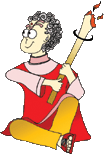Spoken
by Supreme Master Ching Hai at the Hsihu Center, Formosa,
January 8, 1995 (Originally in Chinese) Videotape No. 466
There
was once an Indian woman named Devi. Indian people usually have
sacred and great names related to God. A "Devi" is a female
Deva (Heavenly being), and the name bears great meaning. Sometimes,
Indians name their children after Indra (the mythological king of
the abode of the gods) in hopes that they will be better humans.
This Indian woman
Devi had a young son named Lahuve. The mother and child had to flee
their home, which was occupied by an evil spirit that had killed
many members of their family, including Devi's parents-in-law and
Lahuve's six uncles. Therefore, she decided to take her teenage
son away from the haunted house for they were the sole survivors
in their family. Devi took her son to another place, where she ran
a business for a living.
Several years
later, Lahuve, now grown up, asked his mother: "Mom! Where
did we come from? My friends always ask me this question and I don't
know how to answer them. They want to know why we left our ancestral
house." Indian people, like the Chinese, the Aulacese and other
people in Asia, highly treasure their ancestral homes.
Thus, his mother
told him this story: "In our old abode, eight members of our
family were killed by a ghost. Fearing that we would be his next
victims, I decided that we shouldn't live there anymore for it would
bring us harm." And Lahuve said, "Well! What's so strange
about people dying in a house? Where there is birth, there will
be death. People die when their time comes. They have already died.
Why should we leave our ancestral home? We should return; nothing
will happen to us!" His bravery was so convincing that his
mother finally consented. They then packed their luggage and went
home.
Nevertheless,
fear dwelled in Devi's heart. Every day, she would make offerings
to the ghost before each meal, and Lahuve was very curious about
her behavior.
One day, Devi
prepared one of her son's favorite dishes, and he wanted to have
the ghost's share as well. Of course, his mother forbade him. So
he asked, "Why? For whom is this food reserved? I like this
dish very much and I didn't have enough." Devi said, "This
is an offering to the ghost. He has already killed eight of our
kin. If we don't offer him food, he will kill us, too."
Lahuve was unconvinced
by his mother's explanation, and said, "How could this be?
Why do you pay so much attention to the ghost? He might not have
been responsible for our relatives' deaths." Devi firmly believed
that the ghost was behind the family tragedy, for her eight relatives
had died one after another. But she had never seen the ghost; she
just imagined everything. Her disbelieving son insisted: "Just
let me eat it! There is no ghost!" He wanted the food very
much, despite his mother's disapproval. She then said, "Please!
Don't eat it, don't! Let the ghost have it. If you eat it, the ghost
will kill you. What will I do then?"
That day, the
ghost really came to enjoy the food. Lahuve sat there waiting for
him to appear. When he did, Lahuve asked, "Hey! Ghost! Who
are you?" and the ghost told him, "Young man, I am the
third brother of your grandfather. After I died, I killed your grandfather
and your uncles, because they robbed me of my wealth and let me
die in poverty and pain. Therefore, I took my vengeance by killing
them all."
Lahuve then asked,
"What power do you possess?" The ghost said, "I am
extremely powerful. I killed your uncles and grandfather as easily
as you swat flies. No problem at all! I could have killed your mother
as well, but she fled. Though she has come back, she offers me food
every day, so I spare the two of you. Listen carefully. I can fly
to Heaven, the abode of the angels, in an instant. I can also fly
to the abode of the ghosts. Don't you think that I am terrific?"
Lahuve said,
"If you are really so powerful, can you take me to the deities
and angels?" The ghost said, "No, I can't." Lahuve
said, "Then, can you convey a message to them for me?"
The ghost said, "Sure! What do you want to say to them?"
The young man said, "Please ask the angels how long I will
live here? How old can I live to be?" The ghost said, "Okay,
I will." Then he left.
The ghost came
again the next day and said to Lahuve, "The angels said that
you can live to the age of sixty." Lahuve asked, "Please
ask them again if it is possible for me to die earlier, say around
forty to fifty? Can I be killed earlier? If this is not possible,
then can they let me live longer until I am a hundred years old?"
The ghost said, "Okay, I will ask again for you." He then
departed again to ask the angels.
The next day,
the ghost came back and said to Lahuve: "I have conveyed your
request to the angels, but they wanted me to tell you that it is
not possible. You can die neither a moment earlier nor later, because
the length of human life is predestined."
Upon hearing
these words, Lahuve immediately swallowed the offerings set aside
for the ghost and rushed into the kitchen. He picked up a big piece
of wood, lit it, and used it to beat
and chase the ghost away. He said: "If you do not get out,
I will kill you; I will continue to beat you." The ghost displayed
his deadly fangs and claws trying to scare them. Devi implored her
son to stop doing that. But Lahuve said, "Mom! Don't you worry!
The angels told me that we can't die any earlier or later. So, why
are you still afraid of the ghost?" The ghost threatened to
kill them both if they did not offer him food. However, he had also
heard with his own ears the angels say that it is impossible to
die earlier or later. Therefore, he had nothing more to say, and
was beaten out of the house by Lahuve. After Lahuve had learned
the truth, the ghost could not threaten him anymore, and the ghost
was aware of that, too. (Applause)
If we have God
and Buddha in our heart, will we still fear ghosts? God and the
Buddha are the highest. If we are still afraid of ghosts, that shows
we do not have enough faith in God or Buddha. Our faith is still
too weak. Therefore, ghosts can only intimidate weaker people; they
fear those people who practice spiritually and have stronger willpower.



